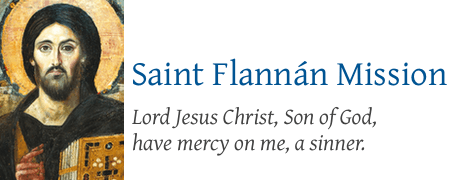Fr Tikhon told us about Archimandrite Antippus, who was a tall powerful man with lots of military decorations. Despite his imposing exterior, Fr Antippus was one of the most loved priests, because of his kindness and compassion to all who approach him. He would hear confessions and forgive sins through his priesthood.
Another reason why the young monks in the monastery loved Fr Antippus was because of Akathist prayers. While some younger monks were not thoroughly enthusiastic at praying the Akathist, Fr Antippus was always joyous when he recited the Akathist, and would gladly relieve any monk to recite the Akathist instead.
But alas, Fr Antippus grew old, and eventually, he was too weak to stand for so long to recite the Akathist prayers, and had to be relieved of what he always loved to do. He wept, and the congregation wept with him, on his last Akathist.
During that time, Akathist prayers were handwritten, and there were so many prayers that Fr Antippus had to lug a large suitcase of these prayers. On his last service, some Russians from foreign lands, came by for the service, and left a small, beautifully printed Akathist pocket book in Church Slavonic for Fr Antippus. Fr Antippus was so elated at this pocket Akathist prayer book, and would put on his thick glasses to read the prayers in his cell all the time (Romans 12:12).
Eventually, Fr Antippus came close to the end of his journey, and went to the caves to confess all his sins to his reposed spiritual confessor, great schemamonk Fr Savva. After his confession, he summoned his last strength and walked back to the monastery.
By God’s Grace, Fr Antippus was buried right next to his confessor, Fr Savva. In life and in death, the spiritual father and his spiritual son stayed close.
In our lifelong journey as Christians, we will come across long and short prayers, long and short liturgies, and without ever knowing our end, will endure our spiritual struggles no matter how long or short. This mystery of life and death will elude us, and we will strive to walk this journey from beginning to the end.
We can therefore choose to embrace every prayer (1 Thessalonians 5:16-18) that we encounter with joy like Fr Antippus, rather than simply dismiss them based on our own shallow preferences. Every prayer towards God is meaningful and fruitful in our struggles towards God. When we attend the long Divine Liturgy, or pray the Jesus Prayer quietly in a corner, or pray the Akathist, every one of these prayers are counted in our struggles towards God. And God hears all prayers.
Lord Jesus Christ, Son of God, have mercy on me, a sinner.
☦
